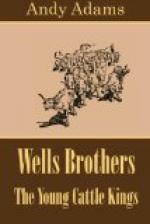Dell treated the idea of buying cattle with slight disdain. “You—going—to—buy—more—cattle?” said he, accenting each word. “Any one tell your fortune lately?”
“Yes,” answered the older boy. “I’m having it told every day. One of those two men, the gray-haired one on that buckboard,—stand here and you can see them,—told me over a year ago that this range had a value, and that we ought to skirmish some cattle, some way, and stock it. What he saw clearly then, I see now, and what Mr. Lovell sees now, you may see a year hence. These men have proved their friendship, and why stand in our own light? Our ability to hold cattle was tested last winter, and if this range is an asset, there may be some way to buy more cattle. I’m going to Dodge in August.”
Dell was silenced. There was ample time to set the ranch in order. Turning away from the old trail, on the divide, and angling in to headquarters, and thence northward, was but a slight elbow on the general course of the trail herds. The long distance across to the Republican would compel an early watering on the Beaver, that the cattle might reach the former river the following evening. The brothers knew to a fraction the grazing gait of a herd, the trailing pace, and could anticipate to an hour the time required to move a herd from the Prairie Dog to the Beaver.
The milk cows and calves were turned back into the general herd. The dead-line was drawn safely below Hackberry Grove, between imaginary landmarks on either slope, while on the creek, like a sentinel, stood a lone willow which seemed to say, “Thus far shalt thou go and no farther.” The extra horses, now in the pink of condition, were brought home and located below the ranch, and the house stood in order.
The arrival of the first herd had been correctly calculated. The brothers rode out late on the morning designated, but did not reach the divide. The foremost herd was met within seven miles of the Beaver, the leaders coming on with the steady stride of thirsty cattle that had scented water. Priest was nowhere in sight, but the heavy beeves identified the herd, and when the boys hailed a point man, the situation cleared.
“Mr. Paul—our boss?” repeated the point man. “He’s setting up a guide-board, back on the divide, where we turned off from the old trail. Say, does this dim wagon track we’re following lead to Wells Brothers’ ranch?”
“It does,” answered Joel. “You can see the willows from the next swell of the prairie,” added Dell, as the brothers passed on.
It was a select herd of heavy beeves. In spite of the drouth encountered, the cattle were in fine condition, and as the herd snailed forward at its steady march, the sweep of horn, the variety of color, the neat outline of each animal blended into a pastoral picture of strength and beauty.
The boys rode down the advancing column. A swing man on the opposite side of the herd waved his hand across to the brothers, and while the two were speculating as to who he might be, a swing lad on the left reined out and saluted the boys.




